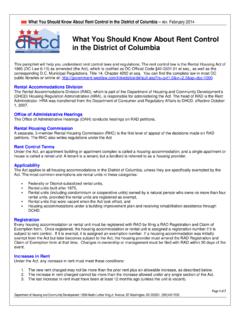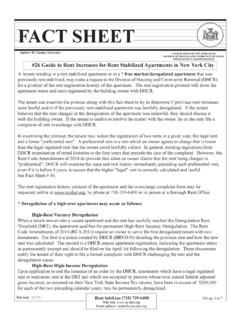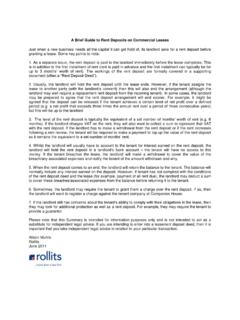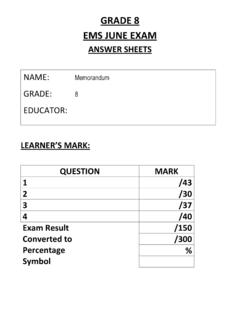Transcription of Elderly Disabled Procedures - Rent Control Consultants
1 Elderly & Disabled Definition The definition of Elderly and Disabled tenants for the purpose of computing the CPI- based increases in rent charged is as follows: Elderly . An Elderly tenant is sixty-two years old or older, with no income limit. Disabled . A Disabled tenant has a medically determinable physical impairment, including blindness, which prohibits and incapacitates 75% of that person's ability to move about, to assist himself or herself, or to engage in an occupation. There is no income limit. Initiation of a Claim The issue of whether a tenant is Elderly or Disabled arises when the tenant makes a claim for protection under the Elderly or Disabled provision of the Act.
2 A claim will likely arise in one of the following ways: (1) A housing provider can distribute a notice to all tenants setting forth the definition of Elderly and Disabled and asking those tenants to contact the housing provider if they believe they qualify. Under this option, the housing provider is likely to have an opportunity to review each claim before it is submitted to the agency. (2) A housing provider can distribute Application for Elderly or Disabled Status forms to all the tenants with a cover notice saying that any tenant who believes the tenant qualifies as Elderly or Disabled should complete the form and submit it to the Rent Admin- istrator and give a copy of the form to the housing provider.
3 Under this option, claims are more likely to go directly to the agency. (3) A housing provider can simply wait until Notices of Increases in Rent Charged are sent to the tenants. The notices contain a paragraph distinguishing between Elderly and Disabled tenants and other tenants in the applicability of CPI-based increases. The paragraph in the notice should be sufficient to alert any tenant who is Elderly or dis- abled to claim that status. It is likely that the tenant will respond by contacting the hous- ing provider before going to the agency. Response to a Claim If a tenant makes a claim for Elderly or Disabled status to the housing provider, the housing provider has two options: (1) The housing provider can confer with each tenant, review the evidence pre- Rent Control Consultants , Inc.
4 60 Market Street, Suite 211, Gaithersburg, MD 20878. 240-361-6161. sented by the tenant, and decide whether the evidence is sufficient. If the housing pro- vider believes the evidence is sufficient, the housing provider can simply designate the tenant as Elderly or handicapped and limit rent increases to the tenant accordingly. If the housing provider believes the evidence is insufficient or ambiguous, the housing provider can give the tenant an Application for Elderly or Disabled Status form, ask the tenant to complete the form and submit it to the Rent Administrator and give a copy of the form to the housing provider.
5 (2) The housing provider can make no attempt to evaluate the evidence. The housing provider can give each tenant an Application for Elderly or Disabled Status form, ask the tenant to complete the form and submit it to the Rent Administrator and give a copy of the form to the housing provider. Response to an Application Form When a tenant completes an Application for Elderly or Disabled Status, the tenant must (a) give a copy, with any supporting documentation, to the housing provider and (b) file the form, with the supporting documentation, with the agency. Once the housing provider receives the Application form, the housing provider has two choices -- (1) The housing provider can do nothing.
6 If the form is properly filled in and the evidence is sufficient, there is no reason for the housing provider to respond. The tenant is very likely to be determined by the Rent Administrator as Elderly or Disabled . (2) The housing provider can object to the tenant's Application. To do so the housing provider must file a written objection with the agency, identifying the Application by tenant name, address and rental unit, and stating the objection. The objection must be filed within ten days after the housing provider receives notice of the Application for Elderly or Disabled Status. Because of the time limit, the housing provider should be sure to (a) instruct all employees what to do if they receive an Application, (b) date-stamp or otherwise identify the date on which a copy of the Application is received, and (c) get a copy of the housing provider's response date-stamped by the agency when filed.
7 Typical objections might be that no evidence of the claim was attached to the copy of the Application given to the housing provider, or that the evidence was unreadable, or that the evidence simply did not support the claim. Because of the 75%-incapacitation rule for disability, disability claims are more likely to be disputed than Elderly claims. Hearing If the housing provider disputes an Application for Elderly or Disabled Status, there will be a hearing to consider the evidence, which will allow the housing provider to present any objections and argue in favor of denying the claim. A written decision will be issued.
8 Rent Control Consultants , Inc. 60 Market Street, Suite 211, Gaithersburg, MD 20878. 240-361-6161. Criteria There are no regulations and few prior decisions to guide determinations of whether a tenant qualifies as Elderly or Disabled . There are a few points to consider. (1) The Elderly or Disabled person must be a tenant. If the person is simply an occupant allowed to reside in the rental unit but not identified as the tenant, the actual tenant doesn't qualify as Elderly or Disabled . A typical example would be a parent who has moved in with a child. (2) If there is more than one person identified as a tenant, it is probably suffi- cient that just one of the persons qualifies as Elderly or Disabled .
9 If, however, the Elderly or Disabled tenant does not contribute materially to the income of the household, the housing provider may have an argument against limiting CPI-based increases in rent. (3) If the tenant makes application for Elderly or Disabled status within a rea- sonable time following a rent increase, the determination of status will likely be retroactive to the effective date of the rent increase. If the tenant takes several months to apply, however, the Elderly or Disabled status may not apply until the next CPI-based increase in rent charged. Probably the facts of the specific case will be dispositive. Because the law is new and no regulations exist, it is difficult to predict how deter- minations will be made.
10 Rent Control Consultants , Inc. 60 Market Street, Suite 211, Gaithersburg, MD 20878. 240-361-6161.








